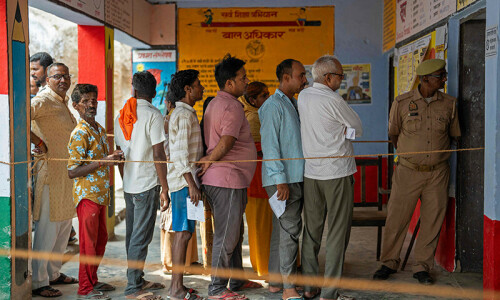ISLAMABAD: The Pakistan Bar Council has threatened to challenge any legislation aimed at increasing the strength of the Supreme Court judges if done without taking the top court and the PBC into confidence.
“The strength of the judges of the Supreme Court has to be determined only after mandatory and purposive consultations with the apex court as well as PBC, the latter being a vital stakeholder in the area of administration of justice in the country,” said a resolution adopted during an emergency meeting of the council held here on Wednesday at its Islamabad office inside the Supreme Court.
The newly-elected Vice Chairman of the PBC, Senator Dr Farogh Naseem, presided over the meeting.
The meeting was held apparently against the backdrop of a proposal which the Senate was seized with suggesting an increase in the number of Supreme Court judges to 26 from 17.
The proposal was floated by the Senate Committee of the whole House, which was formed in May 2015 on the basis of a resolution moved by MQM Senator retired Col Tahir Mashhadi.
“We do not want to create any obstacles in the appointment of superior court judges, but all we need was that the highest body should be taken into confidence,” Dr Naseem told media.
He, however, said there was no need to increase the number of the apex court judges rather the strength of the provincial high courts should be enhanced in view of a heavy backlog of cases.
The PBC resolution also emphasised that the council was the highest statutory body and regulator for lawyers and law colleges / universities.
“In case any legislative amendment is brought about to increase the strength of judges of the Supreme Court without purposive consultations with the Supreme Court and PBC, the council will challenge such amendments on grounds that it was unconstitutional, considering that PBC after the 18th Amendment had an effective say in the appointment and confirmation of judges in the superior judiciary,” the resolution emphasised.
It also said that for similar reasons all the appointments of ad hoc judges and additional judges of the Supreme Court in future will also have to be finalised after purposive consultations with the PBC.
Dr Naseem also had reservations about the role of the parliamentary committee in the appointment of the superior court judges under the 18th Amendment and said the procedure adopted by the committee was not fair because the composition of eight-member bi-partisan committee was not just.
“I challenge the merit of the committee’s composition. Parliamentarians who can play an affective role because of their understanding and experience have not been made its members.”
Rather the entire procedure of appointing the judges have been politicised when only the legal acumen, experience and antecedent of the candidates to be elevated as the judges should be enough while doing away prejudices like ethnic, linguistic or religious backgrounds, he said, adding that political reasons should entirely be offloaded from the appointment procedure.
But former chairman of PBC’s executive committee Ahsan Bhoon said the parliamentary oversight was necessary in the appointment of judges to avoid Judicial Commission that recommended the candidates to be elevated as judges from becoming a consortium of the judges. He also reminded that the PBC had earlier adopted a resolution in this regard.
Meanwhile, Dr Naseem told reporters that the PBC would soon discuss the recent statement of Prime Minister Nawaz Sharif on clipping the NAB’s wings and said the government had to bring a new legislation if it really wanted to contain the bureau.
He said the NAB was a legal and statutory body but the appointment of its chairman was done under a constitutional provision after meaningful consultation between the leader of the house and the leader of the opposition. The Supreme Court had held in one of its judgments that the consultation of the chief justice was also necessary in the appointment of NAB chairman, he added.
He emphasised that the NAB should be allowed to function independently, instead of using it for political victimisation, otherwise corruption could not be weeded out from the country.
Published in Dawn, February 18th, 2016













































Dear visitor, the comments section is undergoing an overhaul and will return soon.